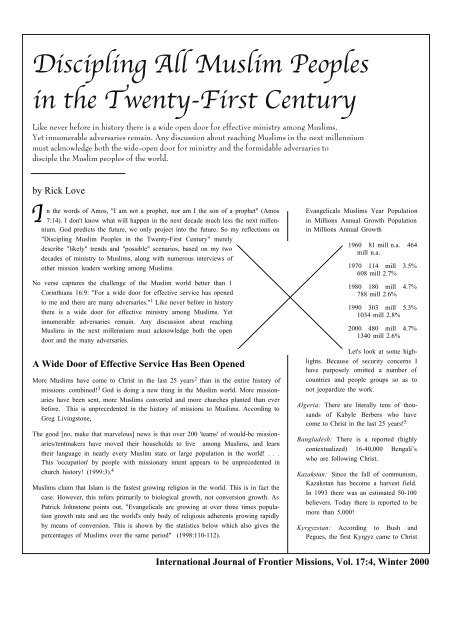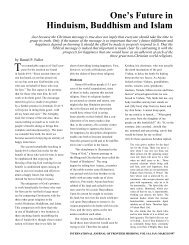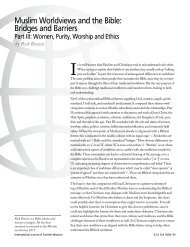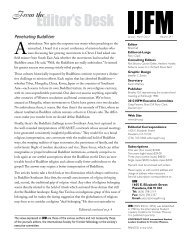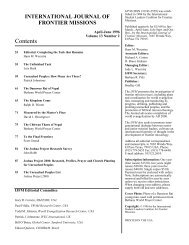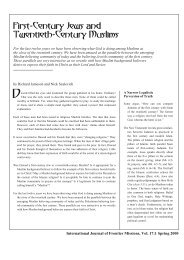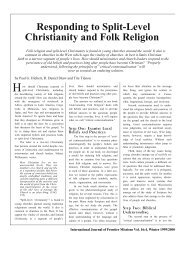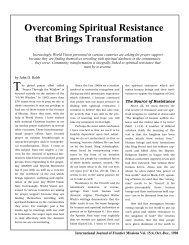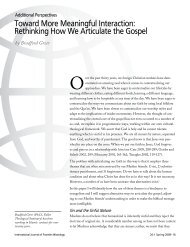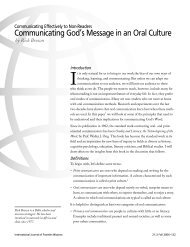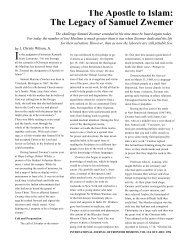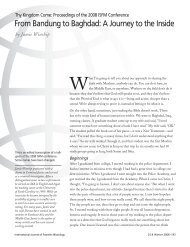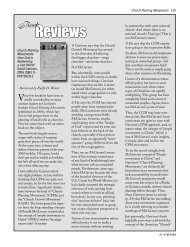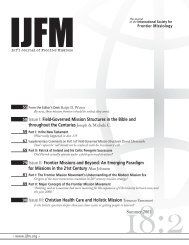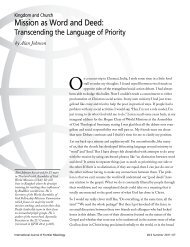Discipling All Muslim Peoples in the Twenty-First Century
Discipling All Muslim Peoples in the Twenty-First Century
Discipling All Muslim Peoples in the Twenty-First Century
You also want an ePaper? Increase the reach of your titles
YUMPU automatically turns print PDFs into web optimized ePapers that Google loves.
6<strong>Discipl<strong>in</strong>g</strong> <strong>All</strong> <strong>Muslim</strong> <strong>Peoples</strong><strong>in</strong> 1986. Today <strong>the</strong>re are also an estimated4,000 believers (1999:150).Ano<strong>the</strong>r reputable source <strong>in</strong>dicates that<strong>the</strong>re are over 20 Kyrgyz speak<strong>in</strong>gchurches with many more Kyrgyzattend<strong>in</strong>g Russian speak<strong>in</strong>g churches.Albania: Less than a decade ago Albaniawas considered to be Europe's mostclosed country and least evangelizedland -- proudly claimed to be <strong>the</strong>world's first a<strong>the</strong>ist state yet alsoEurope's only <strong>Muslim</strong> state. S<strong>in</strong>ce <strong>the</strong>fall of communism, missionariesflooded <strong>the</strong> country. Over 200churches have been planted with over6,000 believers.Pakistan: A s<strong>in</strong>gle women saw 646 peoplemake decisions for Christ over anextended m<strong>in</strong>istry to <strong>the</strong>se people.While many did not end up <strong>in</strong> churchesMore missionariesthan ever before <strong>in</strong>history are<strong>in</strong>tentionallyseek<strong>in</strong>g to evangelize<strong>Muslim</strong>s. Moreworkers means moresow<strong>in</strong>g, moresow<strong>in</strong>g means morereap<strong>in</strong>g. Thisunchang<strong>in</strong>g,axiomatic pr<strong>in</strong>cipledescribes why we maybe on <strong>the</strong> harb<strong>in</strong>gerof harvest among<strong>Muslim</strong>s.<strong>the</strong>re is at least one church of 75 baptizedbelievers that can be attributed to her work. After 15 years of m<strong>in</strong>istry, acouple <strong>in</strong> ano<strong>the</strong>r area saw no fruit. In <strong>the</strong>ir next eight years of m<strong>in</strong>istry <strong>the</strong>y saw100 come to Christ (Cate 1999).Burk<strong>in</strong>a Faso: There is a movement of 30-40,000 MBBs (a very conservative estimate)among <strong>the</strong> Assemblies of God.Emerg<strong>in</strong>g beachheads are be<strong>in</strong>g established among <strong>the</strong> Pulaar, Tuareg, Turks, Tajik,Turkmen, Uzbek, Kurds, Marano, and Sundanese. I prefer to call <strong>the</strong> emerg<strong>in</strong>gchurches among <strong>the</strong>se peoples as "beachheads" <strong>in</strong> contrast to "breakthroughs." I usebeachhead to refer to an emerg<strong>in</strong>g church which may or may not have formalized<strong>in</strong>digenous leadership. A breakthrough implies that <strong>the</strong>re is formal <strong>in</strong>digenous leadershipand sister churches are be<strong>in</strong>g planted.Non-Western Missionaries to <strong>Muslim</strong>s: Approximately 100 Korean missionaries and200 Lat<strong>in</strong>o missionaries are work<strong>in</strong>g among <strong>Muslim</strong>s. 6Note carefully that I consider what God is do<strong>in</strong>g now among <strong>Muslim</strong>s a new th<strong>in</strong>g, nota great th<strong>in</strong>g. Books like, The Move of <strong>the</strong> Holy Spirit <strong>in</strong> <strong>the</strong> 10/40 W<strong>in</strong>dow by LuisBush and Beverly Pegues declare that God is <strong>in</strong> fact presently do<strong>in</strong>g a "great th<strong>in</strong>g"<strong>in</strong> <strong>the</strong> 10/40 w<strong>in</strong>dow. In fact, <strong>in</strong> many ways and <strong>in</strong> certa<strong>in</strong> areas, He is. A carefulread<strong>in</strong>g of this book, though, shows that many of <strong>the</strong> great breakthroughs recordedare outside of <strong>the</strong> <strong>Muslim</strong> world. When <strong>the</strong>re is mention of <strong>Muslim</strong> breakthroughs itis encourag<strong>in</strong>g and generally accurate, but one f<strong>in</strong>ds a tendency to overstate. 7 Forexample, <strong>the</strong> title of one section reads: "Ethiopia: One of <strong>the</strong> Great MissionaryForces." The description below <strong>the</strong> title, however, is more accurate: "The EthiopianChurch could well become one of <strong>the</strong> great missionary forces at <strong>the</strong> turn of <strong>the</strong> millennium"(1999:154).Descriptions of future potential should not be confused with present reality. Visioncast<strong>in</strong>g, mobilization and optimism, must be balanced by hard analysis and fieldrealities. For example, one of our teams <strong>in</strong> <strong>the</strong> Middle East has witnessed well overone hundred <strong>Muslim</strong>s pray to receive Christ <strong>in</strong> <strong>the</strong> last five years. Excit<strong>in</strong>g and perhapsunprecedented. However, when we ask <strong>the</strong> team how many <strong>Muslim</strong> backgroundbelievers (MBBs) are actually <strong>in</strong> <strong>the</strong>ir church, <strong>the</strong>y say <strong>the</strong>re are eighteen -on a good night!Greg Liv<strong>in</strong>gstone shares ano<strong>the</strong>r example of missiological overstatement:Our colleague George Otis Jr. <strong>in</strong> his book Last of <strong>the</strong> Giants wrote that <strong>the</strong> entireadult population of a Kabyle village of 5,000 <strong>Muslim</strong>s had <strong>the</strong> same dream, on<strong>the</strong> same night and discovered <strong>the</strong> next morn<strong>in</strong>g that <strong>the</strong>y were all converted! Alittle diagnostic research by veteran AWM missionary Wendell Evans revealedthat <strong>the</strong> facts are quite different. It was not a village of 5,000, but Bejaia, a cityof 100,000. There were not 5,000 <strong>Muslim</strong> new followers of Christ, but 300. Itdid not happen overnight, but over ten years! Still, <strong>the</strong> truth is wonderful enough(1999:3-4).Ask<strong>in</strong>g hard questions about mission statistics is also crucial. For example, accord<strong>in</strong>g toTodd Johnson <strong>the</strong>re are presently about 3,000 missionaries to <strong>Muslim</strong>s, whereas PatrickJohnstone estimates about 8,460 (of 134,000 Protestant missionaries worldwide).It all depends on how you def<strong>in</strong>e your terms. When asked how he def<strong>in</strong>esmissionaries <strong>in</strong> <strong>the</strong> <strong>Muslim</strong> world Patrick Johnstone conceded <strong>the</strong> follow<strong>in</strong>g to GregLiv<strong>in</strong>gstone:International Journal of Frontier Missions
7Contextualization is "<strong>the</strong> art of plant<strong>in</strong>g <strong>the</strong>gospel seed <strong>in</strong> cultural diverse soils withoutalso plant<strong>in</strong>g <strong>the</strong> flower pot". As more and moremissionaries sow gospel seed among <strong>Muslim</strong>swithout plant<strong>in</strong>g <strong>the</strong>ir pots, <strong>Muslim</strong>s respond.When <strong>the</strong> gospel is proclaimed <strong>in</strong> culturallyrelevant ways, <strong>Muslim</strong>s repent!1. His figures refer to those who are <strong>in</strong> residence <strong>in</strong> <strong>Muslim</strong> countries, whe<strong>the</strong>r or not<strong>the</strong>y spend any time with <strong>Muslim</strong>s.2. A high percentage of <strong>the</strong>se workers would be focused on media, or <strong>in</strong>stitutional, orrelief and development m<strong>in</strong>istries, not direct disciple-mak<strong>in</strong>g.3. Probably more than 50% [possibly much higher] do not know <strong>the</strong> language(s) wellenough to teach <strong>the</strong> bible or make disciples.4. These estimates <strong>in</strong>clude aspirational statements of Koreans, Brazilians, etc. whomay not actually be on site engaged <strong>in</strong> m<strong>in</strong>istry.Never<strong>the</strong>less, <strong>the</strong>re are five reasons that I believe God is do<strong>in</strong>g a "new th<strong>in</strong>g" <strong>in</strong> <strong>the</strong><strong>Muslim</strong> world. (1)More workers, (2)More collaboration, (3) Contextualization, (4)Prayer, signs and wonders and spiritual warfare, (5) Socio-political change.More Workers. This refers to <strong>the</strong> quantitative dimension of m<strong>in</strong>istry to <strong>Muslim</strong>s. Moremissionaries than ever before <strong>in</strong> history are <strong>in</strong>tentionally seek<strong>in</strong>g to evangelize<strong>Muslim</strong>s. More workers means more sow<strong>in</strong>g, more sow<strong>in</strong>g means more reap<strong>in</strong>g.This unchang<strong>in</strong>g, axiomatic pr<strong>in</strong>ciple describes why we may be on <strong>the</strong> harb<strong>in</strong>ger ofharvest among <strong>Muslim</strong>s.More Collaboration. This refers to <strong>the</strong> relational and efficiency dimensions of m<strong>in</strong>istryto <strong>Muslim</strong>s. Missions agencies are serv<strong>in</strong>g one ano<strong>the</strong>r and work<strong>in</strong>g toge<strong>the</strong>rlike never before. Lone Ranger approaches are now <strong>the</strong> exception ra<strong>the</strong>r than <strong>the</strong>rule. Partnership and network<strong>in</strong>g is <strong>in</strong>. The birth of Phill Butler's InterDev to facilitate<strong>in</strong>ter-mission partnerships best reflects this emphasis. In Central Asia, Sou<strong>the</strong>rnBaptists help procure visas for many o<strong>the</strong>r missions, <strong>in</strong>clud<strong>in</strong>g Frontiers, Pioneers,and YWAM. This k<strong>in</strong>d of cooperation models Christ's love and maximizesChrist's resources.Contextualization. This refers to <strong>the</strong> cultural dimension of m<strong>in</strong>istry to <strong>Muslim</strong>s. HarvieConn def<strong>in</strong>es contextualization as "<strong>the</strong> art of plant<strong>in</strong>g <strong>the</strong> gospel seed <strong>in</strong> culture'sdiverse soils without also plant<strong>in</strong>g <strong>the</strong> flower pot"(1982:12). As more andmore missionaries sow gospel seed among <strong>Muslim</strong>s without plant<strong>in</strong>g <strong>the</strong>ir flowerpots, <strong>Muslim</strong>s respond. When <strong>the</strong> gospel is proclaimed <strong>in</strong> culturally relevant ways,<strong>Muslim</strong>s repent! 8Prayer, Signs and Wonders and Spiritual Warfare. This refers to <strong>the</strong> power dimensionof m<strong>in</strong>istry to <strong>Muslim</strong>s. Patrick Johnstone's prayer guide for global <strong>in</strong>tercessors,Operation World, is but one <strong>in</strong>dicator of an <strong>in</strong>creased emphasis on prayer for <strong>the</strong>nations and thus for <strong>Muslim</strong>s. It seemslike <strong>the</strong> church of Jesus Christ is pray<strong>in</strong>gabout <strong>Muslim</strong>s like never before.Pray<strong>in</strong>g through <strong>the</strong> W<strong>in</strong>dow I, II, IIIare evidence of this (Bush and Pegues1999: 228-230). People of all agescriss-cross <strong>the</strong> globe on prayer walks.Intercessors approach <strong>the</strong> throne ofgrace <strong>in</strong>cessantly for <strong>the</strong> sake of <strong>Muslim</strong>nations. This illustrates a basictruth: more prayer means more power,more power leads to more breakthroughs.9From North Africa to Sou<strong>the</strong>ast Asia,accounts of signs and wonders, dreamsand visions lead<strong>in</strong>g to <strong>Muslim</strong> conversionare common - even among workersfrom traditions which have not historicallyencouraged supernaturalmanifestations of God's presence andpower10 J. Dudley Woodberry, forexample, has 600 documented cases of<strong>Muslim</strong>s com<strong>in</strong>g to Christ throughdreams and visions (1999a).In addition, <strong>the</strong> church around <strong>the</strong> worldhas a grow<strong>in</strong>g understand<strong>in</strong>g of spiritualwarfare and how it relates to fulfill<strong>in</strong>g<strong>the</strong> Great Commission. 10Socio-political Change. This refers to <strong>the</strong>social and political dimensions of m<strong>in</strong>istryto <strong>Muslim</strong>s. The fall of communismhas altered <strong>the</strong> face of <strong>the</strong> globeand opened up many parts of <strong>the</strong> <strong>Muslim</strong>world to Christ, most notably Albaniaand Central Asia. A dramatic<strong>in</strong>crease <strong>in</strong> urbanization 11 also presentsVol. 17:4, W<strong>in</strong>ter 2000
8<strong>Discipl<strong>in</strong>g</strong> <strong>All</strong> <strong>Muslim</strong> <strong>Peoples</strong>us with new opportunities. Over halfof <strong>the</strong> world's people now live <strong>in</strong> cities.Accord<strong>in</strong>g to Woodberry, "Those com<strong>in</strong>gto <strong>the</strong> city have needs and are moreopen to new ideas" (1999a). Globalization12 and <strong>the</strong> explosion of technologyradically impact <strong>in</strong>ternational relationsand communication, mak<strong>in</strong>g <strong>the</strong> gospelmuch more accessible to <strong>Muslim</strong>s.The clash between globalization (<strong>in</strong>tegrallyl<strong>in</strong>ked to western values) andIslamic Fundamentalism is vividlydescribed <strong>in</strong> an Atlantic Monthly articleentitled: "Jihad Vs. McWorld"(March 1992). Accord<strong>in</strong>g to Benjam<strong>in</strong>Barber <strong>the</strong> author, "The forces of Jihadand <strong>the</strong> forces of McWorld operatewith equal strength <strong>in</strong> opposite directions,<strong>the</strong> one driven by parochialhatreds, <strong>the</strong> o<strong>the</strong>r by universaliz<strong>in</strong>gmarkets" (1992:53). This clash leads toreceptive hearts, accord<strong>in</strong>g to Woodberry:We observed an <strong>in</strong>terest<strong>in</strong>g phenomenon<strong>in</strong> Iran after <strong>the</strong> Khome<strong>in</strong>i revolution,and <strong>in</strong> Pakistan after Zia al-Haq triedto <strong>in</strong>troduce sharia law, and we see itnow elsewhere. Whenever <strong>the</strong>re is arise of militant or repressive Islam and<strong>the</strong>re are recognizable Christians, <strong>the</strong>reis receptivity to <strong>the</strong> gospel. Thedynamics are as follows: There hasbeen a seculariz<strong>in</strong>g trend from Westernglobalization that has led to <strong>the</strong> loss oftraditional and religious values. Whenthis is counteracted by Islamic militancyor <strong>the</strong> imposition of Islamic law,people get disillusioned with Islam.When <strong>the</strong>re are recognizable Christians,<strong>the</strong>y become more receptive to<strong>the</strong> gospel. When more turn to Christ,persecution results (1999a).There are ManyAdversaries While God has openeda wide door for effective m<strong>in</strong>istry <strong>in</strong><strong>the</strong> <strong>Muslim</strong> world, many h<strong>in</strong>drancesand hurdles rema<strong>in</strong>.Suffer<strong>in</strong>g and Martyrdom. Though brimm<strong>in</strong>g with optimism and faith, Bush andPegues also acknowledge <strong>the</strong> <strong>in</strong>tensity of <strong>the</strong> warfare <strong>in</strong> which we are engaged.They don't hesitate to mention our countless adversaries. In fact, <strong>the</strong>y dedicate awhole chapter to <strong>the</strong> sober<strong>in</strong>g realities of persecution and martyrdom (1999:111-134). Accord<strong>in</strong>g to <strong>the</strong>ir research, approximately 26 million Christians have beenmartyred s<strong>in</strong>ce 1900 - more than half of all Christian martyrs ever (1999:124). 13<strong>Muslim</strong> countries like Iran, Sudan and Indonesia illustrate <strong>the</strong>se grim realities. However,as Liv<strong>in</strong>gstone rem<strong>in</strong>ds us, "Prison, expulsion, sickness, and even death are'part of <strong>the</strong> program' as <strong>the</strong>y always have been <strong>in</strong> apostolic mission throughoutchurch history" (1999:7). While this perspective on suffer<strong>in</strong>g isn't a part of ma<strong>in</strong>streamEvangelicalism, it was normative for believers, especially pioneer missionaries,<strong>in</strong> New Testament times (cf. Phil 1:29; Acts 5:40-42; 9:15-16; Col 1:24; 2 Cor2:14-6:10).In most cases, however, <strong>the</strong> type of suffer<strong>in</strong>g faced by workers <strong>in</strong> <strong>the</strong> <strong>Muslim</strong> world ismore mundane. The struggles of language and culture learn<strong>in</strong>g and adaptation, lackof modern amenities, psychological stress because of hostile governments, lonel<strong>in</strong>ess,<strong>in</strong>ter-team conflict, lack of fruit, marriage and family problems and long hoursdo<strong>in</strong>g "tentmak<strong>in</strong>g" become formidable adversaries. Because of <strong>the</strong>se adversaries,precious little time is actually given to evangelism and disciple mak<strong>in</strong>g by manyworkers. Suffer<strong>in</strong>g, sacrifice and martyrdom keep many people from even consider<strong>in</strong>g<strong>Muslim</strong> m<strong>in</strong>istry today.Language, Culture and Religious Barriers. Learn<strong>in</strong>g a new language (often two newlanguages), adjust<strong>in</strong>g to a different culture, and understand<strong>in</strong>g a new religion rema<strong>in</strong>daunt<strong>in</strong>g hurdles to gospel proclamation. The challenges of contextualization, while<strong>in</strong>creas<strong>in</strong>gly understood missiologically, never<strong>the</strong>less rema<strong>in</strong>s formidable - "easiersaid than done."Non Strategic Tentmak<strong>in</strong>g. 14 While thousands of missionaries are <strong>in</strong>volved <strong>in</strong> someform of tentmak<strong>in</strong>g around <strong>the</strong> globe, few of <strong>the</strong>m are <strong>in</strong>volved <strong>in</strong> what I call strategictentmak<strong>in</strong>g. 15 Most tentmak<strong>in</strong>g endeavors are merely workable. They enable <strong>the</strong>missionary to procure a visa and m<strong>in</strong>ister. But <strong>the</strong> role often doesn't make sense tonationals (e.g. a bus<strong>in</strong>essman liv<strong>in</strong>g <strong>in</strong> <strong>the</strong> poor section of town). O<strong>the</strong>r tentmak<strong>in</strong>gstrategies can be called “viable.” These procure a visa, enable <strong>the</strong> missionary tom<strong>in</strong>ister and make sense to <strong>the</strong> people (e.g. a bus<strong>in</strong>ess man who has an office andworks forty hours a week). Strategic tentmak<strong>in</strong>g takes th<strong>in</strong>gs a step fur<strong>the</strong>r. By thiswe mean that one procures a visa, m<strong>in</strong>isters, has a viable role and his tentmak<strong>in</strong>gactually facilitates <strong>the</strong> mak<strong>in</strong>g of disciples (e.g. his bus<strong>in</strong>ess puts him <strong>in</strong> daily contactwith his target people where he can build mean<strong>in</strong>gful relationships). For example,when I was a missionary I taught English. While this was viable, it wasn't strategic,because <strong>the</strong> majority of my students were not <strong>the</strong> ethnic group God had calledme to disciple.Non strategic tentmak<strong>in</strong>g is an adversary to <strong>the</strong> spread of <strong>the</strong> gospel. It results <strong>in</strong> massiveamounts of wasted time and causes many workers to feel duplicitous <strong>in</strong> <strong>the</strong>irrole, <strong>the</strong>reby h<strong>in</strong>der<strong>in</strong>g bold proclamation with full conviction.Erod<strong>in</strong>g Theological Foundations. 16 With <strong>the</strong> rise of postmodernism, relativism andpluralism are mak<strong>in</strong>g strong <strong>in</strong>-roads to <strong>the</strong> church. One example of this can be seen<strong>in</strong> <strong>the</strong> recent Evangelical debate whe<strong>the</strong>r people can be saved apart from a personalfaith commitment to Jesus. 17 The historic belief that "There is salvation <strong>in</strong> no o<strong>the</strong>rname" (Acts 4:12) is los<strong>in</strong>g its <strong>the</strong>ological punch. While this isn't <strong>the</strong> only motivefor world evangelization, 18 it has always provided a powerful, biblical <strong>in</strong>centive.International Journal of Frontier Missions
Rick Love9Pragmatism (what counts is what works) and subjectivism (what I experience is true)provide two fur<strong>the</strong>r illustrations of erod<strong>in</strong>g <strong>the</strong>ological foundations. An overemphasison ei<strong>the</strong>r pragmatism or subjectivism underm<strong>in</strong>es biblical authority <strong>in</strong>practice.Strategic Issues for <strong>the</strong> <strong>Twenty</strong>-<strong>First</strong> <strong>Century</strong>As we turn our attention to <strong>the</strong> next millennium an expand<strong>in</strong>g array of possibilities existfor fur<strong>the</strong>r breakthrough.1. Back to <strong>the</strong> Basics: New paradigms and future strategies are important. But <strong>the</strong>yaren't most important. The old fundamentals of Christian m<strong>in</strong>istry need <strong>in</strong>tentionaland constant cultivation. Our walk with God, our grasp of <strong>the</strong> gospel, and our commitmentto evangelism, discipl<strong>in</strong>g, language and culture learn<strong>in</strong>g must rema<strong>in</strong> primary.The call to sacrifice, suffer and persevere are <strong>in</strong>tegral to m<strong>in</strong>istry.Earlier I noted five reasons that I believe God is do<strong>in</strong>g a new th<strong>in</strong>g among <strong>Muslim</strong>s.We need growth <strong>in</strong> all five areas. We need more workers, more collaboration, bettercontextualization, more prayer, signs and wonders and more effective spiritual warriors.In addition, we need to maximize <strong>the</strong> potential impact of socio-politicalchanges for <strong>the</strong> sake of <strong>the</strong> gospel.2. Two-Thirds World Missions: There are some <strong>in</strong>dications that Two-Thirds World missionsmay well become <strong>the</strong> dom<strong>in</strong>ant missionary force <strong>in</strong> <strong>the</strong> next decade. As notedearlier, more than 100 Korean and 200 Lat<strong>in</strong>o missionaries are now work<strong>in</strong>g among<strong>Muslim</strong>s. The challenge before Western missionaries and agencies is how to facilitatethis potentially massive mission force. Will Western missionaries model servantleadership to help equip <strong>the</strong>se young agencies? Can we develop creative, new structureswhere <strong>the</strong>y will be "at home" <strong>in</strong> our exist<strong>in</strong>g agencies? Or should we set apartpeople <strong>in</strong> our agencies to assist <strong>the</strong> development of new mission structures?3. National Churches: There is a greater openness among national churches <strong>in</strong> <strong>Muslim</strong>countries to reach out to <strong>the</strong>ir <strong>Muslim</strong> neighbors. This has not always been <strong>the</strong> case,however. Liv<strong>in</strong>gstone describes what has historically been a problem with nationalchurches.In a serious discussion, a lead<strong>in</strong>g elder of a Presbyterian church <strong>in</strong> Cairo, who was veryevangelistic among Coptic Christians, was asked about what was be<strong>in</strong>g done by <strong>the</strong>Egyptian Christians on behalf of <strong>the</strong> 90 percent of Cairo that is <strong>Muslim</strong>, 'After all,Ramses, don't we believe that <strong>the</strong> <strong>Muslim</strong>s are go<strong>in</strong>g to Hell?' Look<strong>in</strong>g to his leftand right, he whispered, 'Best place for <strong>the</strong>m' (1993:67).However, God is do<strong>in</strong>g a new th<strong>in</strong>g among national churches. The very church mentionedabove by Liv<strong>in</strong>gstone has reportedly baptized over 500 <strong>Muslim</strong> backgroundbelievers with<strong>in</strong> <strong>the</strong> last decade. When I arrived <strong>in</strong> West Java, Indonesia to workamong <strong>the</strong> Sundanese, every church said <strong>the</strong>y were burdened for <strong>Muslim</strong>s but didvirtually noth<strong>in</strong>g about it. A decade later, many of <strong>the</strong>se same churches are nowactively reach<strong>in</strong>g out to <strong>the</strong> Sundanese - often because missionaries modeled whatcould be done among <strong>Muslim</strong>s and mobilized <strong>the</strong>m to this task. This same th<strong>in</strong>g istak<strong>in</strong>g place <strong>in</strong> Kyrgyzstan, accord<strong>in</strong>g to Don McCurry (1999).4. Technology: The gospel is rippl<strong>in</strong>g through <strong>the</strong> <strong>Muslim</strong> world because of technologicaladvances. The Jesus Film has become a major tool used by virtually every mission.For example, "The Jesus Film onvideo sold 60,000 copies at <strong>the</strong> 1998Cairo International Book Fair" (Woodberry1999a). The SAT-7 satellite televisionis also mak<strong>in</strong>g an impact <strong>in</strong> <strong>the</strong>Middle East. While this program explicitlym<strong>in</strong>isters to Arab Christians,<strong>Muslim</strong>s love to eavesdrop. The Internetalso promises to be a bridge to <strong>the</strong><strong>in</strong>creas<strong>in</strong>g number of educated urban<strong>Muslim</strong>s who “surf <strong>the</strong> net.” Missionagencies should be dedicat<strong>in</strong>g personnelto <strong>the</strong> task of figur<strong>in</strong>g out howtechnology can be <strong>in</strong>creas<strong>in</strong>glyexploited for <strong>the</strong> sake of Christ's gloryamong <strong>Muslim</strong>s.5. Work<strong>in</strong>g with <strong>the</strong> Diaspora: Globalizationgives new strategic value to thoseworkers serv<strong>in</strong>g among <strong>the</strong> <strong>Muslim</strong>Diaspora (<strong>Muslim</strong>s liv<strong>in</strong>g outside of<strong>the</strong>ir homelands, whe<strong>the</strong>r students orimmigrants). M<strong>in</strong>istry to <strong>the</strong> <strong>Muslim</strong>Diaspora has always been importantand a valid end <strong>in</strong> itself. However,with <strong>the</strong> grow<strong>in</strong>g <strong>in</strong>terconnectednessof <strong>the</strong> world, students or immigrantsare more apt to return to <strong>the</strong> homeland,or at least be <strong>in</strong> vital contact with <strong>the</strong>homeland. We should capitalize onthis opportunity.6. Quranic Criticism: Apologetics is not<strong>the</strong> preferred mode of m<strong>in</strong>istry to <strong>Muslim</strong>sfor most workers. However, <strong>the</strong>article, "What is <strong>the</strong> Koran" <strong>in</strong> <strong>the</strong> January1999 edition of Atlantic Monthlyopens up new possibilities. This articleis about textual criticism of <strong>the</strong> Quran<strong>in</strong> light of ancient manuscripts recentlyVol. 17:4, W<strong>in</strong>ter 2000
10<strong>Discipl<strong>in</strong>g</strong> <strong>All</strong> <strong>Muslim</strong> <strong>Peoples</strong>found <strong>in</strong> Yemen. Accord<strong>in</strong>g to Woodberry,<strong>the</strong>re are 1,000 discrepanciesbetween <strong>the</strong>se manuscripts and <strong>the</strong>present Quran. He also notes that 19verses <strong>in</strong> <strong>the</strong> ancient manuscripts arenot <strong>in</strong> <strong>the</strong> present Quran (1999b).This historically verifiable evidence willmake little difference with <strong>the</strong> majorityof <strong>the</strong> world's <strong>Muslim</strong>s. However, itdoes open a door to some and shouldbe capitalized on. The rise of globalizationand urbanization should makeapologetics more fruitful among <strong>the</strong>grow<strong>in</strong>g <strong>Muslim</strong> <strong>in</strong>telligentsia.7. New Paradigms of Tra<strong>in</strong><strong>in</strong>g: New realitiesdemand new paradigms. The wellestablishedBible school or <strong>the</strong>ologicalsem<strong>in</strong>ary has not historically equippedworkers for <strong>the</strong> <strong>Muslim</strong> world. Forexample, <strong>in</strong> most countries, <strong>the</strong> missionarymust be bi-vocational, that is, atentmaker. In addition, many missionarieshave emotional struggles with<strong>the</strong>ir vocation on <strong>the</strong> field (e.g., as abus<strong>in</strong>ess person or English teacher).They see it as a "cover" and thus a perceivedlack of <strong>in</strong>tegrity <strong>in</strong> <strong>the</strong>ir relationshipswith <strong>Muslim</strong>s.These failures of traditional tra<strong>in</strong><strong>in</strong>g canbe remedied with a new holisticapproach to tra<strong>in</strong><strong>in</strong>g. We need todevelop tra<strong>in</strong><strong>in</strong>g centers or <strong>in</strong>stitutions(s<strong>in</strong>ce degrees are important!) that <strong>in</strong>tegratevocational skills with <strong>the</strong>ologicaland missiological tra<strong>in</strong><strong>in</strong>g. A bivocationalapproach to tra<strong>in</strong><strong>in</strong>g bivocationalmissionaries is needed.Biola University is on <strong>the</strong> cutt<strong>in</strong>g edge<strong>in</strong> this area. They presently offer both aTESOL degree and a bus<strong>in</strong>ess degreethat <strong>in</strong>clude cross-cultural tra<strong>in</strong><strong>in</strong>g.8. Maximiz<strong>in</strong>g Crisis Opportunities: Thewars <strong>in</strong> Afghanistan, <strong>the</strong> Gulf, andKosovo, along with <strong>the</strong> earthquake <strong>in</strong>Turkey are sadly "previews of com<strong>in</strong>gattractions." 19 The crisis <strong>in</strong> Kosovo and<strong>the</strong> quake <strong>in</strong> Turkey have affordedFrontiers with significant opportunitiesfor <strong>the</strong> gospel. While we were not adequately prepared for this, our mission didrespond vigorously <strong>in</strong> each case.Mission agencies and churches should be prepared for <strong>the</strong>se com<strong>in</strong>g crises so we canmaximize potential impact. I th<strong>in</strong>k it would be wise to prepare ourselves with rapiddeployment teams tra<strong>in</strong>ed specifically for crisis situations.9. The Local Church as a New Missions Force: More and more local churches want tobe "<strong>in</strong> on <strong>the</strong> action." Ra<strong>the</strong>r than send<strong>in</strong>g money and missionaries through missionagencies, <strong>the</strong>y want to participate. "Taste and see that <strong>the</strong> Great Commission isgood" would be an appropriate battle cry for many local churches today. At first Ithought this was just a Western phenomena, hav<strong>in</strong>g seen it <strong>in</strong> <strong>the</strong> United States and<strong>in</strong> Europe. However, after a recent trip to Costa Rica, I am conv<strong>in</strong>ced that it appliesto <strong>the</strong> church around <strong>the</strong> world.10. A Closure Strategy: There has been much talk about closure strategy at <strong>the</strong>USCWM and <strong>in</strong> <strong>the</strong> AD 2000 movement. They have rightly rem<strong>in</strong>ded us that it isnot enough to carry out <strong>the</strong> Great Commission. We must fulfill <strong>the</strong> Great Commission.One of my burdens <strong>in</strong> <strong>the</strong> next decade is to develop a measurable closure strategyamong all <strong>Muslim</strong> people <strong>in</strong> partnership with o<strong>the</strong>r mission agencies andchurches. Through better collaboration and coord<strong>in</strong>ation we can see reproduc<strong>in</strong>gchurches planted among every <strong>Muslim</strong> people group.ConclusionThe Fourth Era of Missions? 20 Ralph W<strong>in</strong>ter has popularized <strong>the</strong> concept of <strong>the</strong> "ThreeEras of <strong>the</strong> Modern Missions Movement" (W<strong>in</strong>ter and Hawthorne 1999:253-261).The <strong>First</strong> Era was <strong>in</strong>itiated by William Carey (1792-1910). Denom<strong>in</strong>ational agencies,European dom<strong>in</strong>ance and a focus on <strong>the</strong> coastlands characterize this first era.The Second Era was <strong>in</strong>itiated by Hudson Taylor (1865-1980). Faith Missions,American Dom<strong>in</strong>ance and <strong>in</strong>land areas characterize this second era. The Third Erawas started by Cameron Townsend and Donald McGavran (1934-90). SpecializedMissions, Non-Western Dom<strong>in</strong>ance and people groups characterize this era.Could we be on <strong>the</strong> verge of <strong>the</strong> Fourth Era? I believe <strong>the</strong>re is evidence to suggest weneed to th<strong>in</strong>k <strong>in</strong> <strong>the</strong>se terms. I believe W<strong>in</strong>ter's paradigm should be adapted to fit <strong>the</strong>new realities of <strong>the</strong> twenty-first century. Here is one way of look<strong>in</strong>g at what God isdo<strong>in</strong>g:Whe<strong>the</strong>r this is <strong>the</strong> Third or Fourth Era is not that important. What is important is thatwe set our face like a fl<strong>in</strong>t towards <strong>the</strong> <strong>Muslim</strong> world. Because <strong>the</strong> love of Christcontrols us, we must walk through <strong>the</strong> wide-open door whatever <strong>the</strong> cost. Becausepower is perfected <strong>in</strong> weakness, we can overcome every adversary -- through Himwho said, "Lo, I am with you even to <strong>the</strong> end of <strong>the</strong> age."We need to develop tra<strong>in</strong><strong>in</strong>g centers or <strong>in</strong>stitutions(s<strong>in</strong>ce degrees are important!) that <strong>in</strong>tegratevocational skills with <strong>the</strong>ological and missiologicaltra<strong>in</strong><strong>in</strong>g.International Journal of Frontier Missions
EndnotesRick Love1. Paul refers here to his m<strong>in</strong>istry at Ephesus (1 Cor 16:8), <strong>the</strong> site of his longest missionarytenure and <strong>the</strong> climax of his missionary career (Acts 19-20). Paul labored <strong>in</strong>Ephesus for three years—evangeliz<strong>in</strong>g, teach<strong>in</strong>g, heal<strong>in</strong>g <strong>the</strong> sick, cast<strong>in</strong>g outdemons, rais<strong>in</strong>g up leaders and send<strong>in</strong>g out church planters (or church plant<strong>in</strong>gteams) to <strong>the</strong> surround<strong>in</strong>g region. Ephesus was where Paul was most fruitful and <strong>the</strong>Lord’s power most fully manifested through him. Ephesus was <strong>in</strong>deed a wide opendoor.However, Paul also faced “many adversaries.” Ephesus was <strong>the</strong> Mecca of magic <strong>in</strong> <strong>the</strong>ancient world centered <strong>in</strong> <strong>the</strong> religion of Artemis. The famous spiritual warfare passageof Ephesians 6:10-20 grows out of his first hand encounter with <strong>the</strong> powers andpr<strong>in</strong>cipalities at Ephesus. Paul encountered political opposition as well. For <strong>the</strong>religion of Artemis wielded enormous political <strong>in</strong>fluence. Much like present daymissionaries to <strong>the</strong> <strong>Muslim</strong> world, Paul faced <strong>the</strong> tw<strong>in</strong> adversaries of demonic andreligio-political opposition.2. It may be more accurate to say <strong>the</strong> last 35 years. This would <strong>in</strong>clude <strong>the</strong> great harvest<strong>in</strong> Java Indonesia where more than two million Javanese were baptized from 1965-71 (after <strong>the</strong> failed communist coup) (Willis 1977). However, a ground-swell of<strong>in</strong>terest among Evangelicals <strong>in</strong> <strong>in</strong>tentional missions to <strong>Muslim</strong>s began around 1975(Liv<strong>in</strong>gstone 1999).3. This bold declaration is based on <strong>the</strong> follow<strong>in</strong>g considerations. 1) There has been asignificant <strong>in</strong>crease of missionaries to <strong>Muslim</strong>s s<strong>in</strong>ce 1975 that is easily verifiable.2) Estimates of baptized believers with<strong>in</strong> this same time frame show a notable<strong>in</strong>crease <strong>in</strong> numbers, especially when we <strong>in</strong>clude <strong>the</strong> entire <strong>Muslim</strong> world – fromNorth Africa to Sou<strong>the</strong>ast Asia. 3) When compared with past missionary efforts thispresent work of God seems easy to substantiate.4. Liv<strong>in</strong>gstone’s estimate <strong>in</strong>cludes missions such as Frontiers, Pioneers, Assemblies ofGod, Sou<strong>the</strong>rn Baptists, Navigators, AWM, SIM, PMI, YWAM, WEC, and IMI.5. A newspaper article <strong>in</strong> Enquete [an Algerian Newspaper] writes freely about Algeriansbecom<strong>in</strong>g Christians! These are conservative statistics from an <strong>in</strong>terview with aformer missionary <strong>the</strong>re.6. These statistics are from Liv<strong>in</strong>gstone 1999 and Matamoros 1999. <strong>All</strong>an Matamoros is<strong>the</strong> current Director of Fedemec, a Lat<strong>in</strong> American Send<strong>in</strong>g Base <strong>in</strong> Costa Rica. Themissionaries counted refer to those who are do<strong>in</strong>g <strong>in</strong>tentional, long term disciplemak<strong>in</strong>g among <strong>Muslim</strong>s.7. As a mobilizer myself I’ve made my share of overstatements.8. An excellent <strong>in</strong>troduction to contextualization among <strong>Muslim</strong>s can be found <strong>in</strong> <strong>the</strong>follow<strong>in</strong>g articles: “Contextualization Among <strong>Muslim</strong>s: Reus<strong>in</strong>g Common Pillars”by J. Dudley Woodberry <strong>in</strong> <strong>the</strong> International Journal of Frontier Missions Vol 13:4Oct.-Dec. 1996 Pp. 171-186 (orig<strong>in</strong>ally chapter 14 <strong>in</strong> The Word Among Us 1989,edited by Dean Gilliland); “Critical Contextualization” <strong>in</strong> Anthropological Insightsfor Missionaries by Paul G. Hiebert 1985, Pp. 171-192; “Danger! New Directions <strong>in</strong>Contextualization” by Phil Parshall, along with responses by John Travis and DeanGilliland <strong>in</strong> <strong>the</strong> Evangelical Missions Quarterly, Oct 1998 Pp. 404-417. The follow<strong>in</strong>gbooks represent some of <strong>the</strong> best work on <strong>the</strong> topic: Eternal Word and Chang<strong>in</strong>gWorlds: Theology, Anthropology, and Mission <strong>in</strong> Trialogue by Harvie Conn 1984;The Word Among Us: Contextualiz<strong>in</strong>g Theology for Mission Today edited by DeanGilliland 1989. Contextualization: Mean<strong>in</strong>gs, Methods, and Models by David Hesselgraveand Edward Rommen 1989; Anthropological Insights for Missionaries byPaul Hiebert 1985; Christianity <strong>in</strong> Culture: A Study <strong>in</strong> Dynamic Biblical Theologiz<strong>in</strong>g<strong>in</strong> Cross-Cultural Perspective by Charles Kraft 1979; and especially “<strong>Muslim</strong>Contextualization” a Feature Edition of <strong>the</strong> International Journal of Frontier Missions,Vol. 17:1, 2000.10. This prayer movement is a vital powerful force for world evangelization. However,it also has its share of excesses. Pray-ers sometimes make grandiose claims whichf<strong>in</strong>d no precedence <strong>in</strong> Scripture and show no or little verifiable fruit. Declarationslike “We have defeated <strong>the</strong> powers of darkness <strong>in</strong> this region” (though missionarieshave been present <strong>in</strong> <strong>the</strong> region for years) make good prayer letter topics for <strong>the</strong>short term missionary warrior. However,when Jesus describes a similarphenomena <strong>in</strong> Scripture it was because<strong>the</strong> disciples were preach<strong>in</strong>g <strong>the</strong> gospel,heal<strong>in</strong>g <strong>the</strong> sick and cast<strong>in</strong>g outdemons – not prayer walk<strong>in</strong>g (Luke10:1-20).11. See my recently published book: <strong>Muslim</strong>s,Magic and <strong>the</strong> K<strong>in</strong>gdom of God:Church Plant<strong>in</strong>g Among Folk <strong>Muslim</strong>sWilliam Carey Library, 2000, for acomprehensive look at some of <strong>the</strong>seissues.12. The grow<strong>in</strong>g number of books writtenabout spiritual warfare <strong>in</strong> <strong>the</strong> last decadegive ample evidence of this truth.For an <strong>in</strong>troduction to <strong>the</strong> ma<strong>in</strong> <strong>the</strong>mesand perspectives propounded see especially,The Bondage Breaker by NeilAnderson 1990; 3 Crucial Questionsabout Spiritual Warfare by Cl<strong>in</strong>tonArnold 1997’ The Handbook for SpiritualWarfare by Ed Murphy 1992;Defeat<strong>in</strong>g Dark Angels: Break<strong>in</strong>gDemonic Oppression <strong>in</strong> <strong>the</strong> Believer'sLife by Charles Kraft 1992; Wrestl<strong>in</strong>gwith Dark Angels: Toward a DeeperUnderstand<strong>in</strong>g of <strong>the</strong> SupernaturalForces <strong>in</strong> Spiritual Warfare by C.Peter Wagner 1990; Spiritual Warfareby Timothy Warner 1991.13. The whole edition of Urban MissionVol 15, Number 3 March 1998 is dedicatedto <strong>Muslim</strong>s and urbanization.14. Accord<strong>in</strong>g to Woodberry, “Globalizationhas been fostered by mass-media,rapid communications and travel,<strong>in</strong>ternational bus<strong>in</strong>ess, migration,urbanization, and <strong>the</strong> collapse of <strong>the</strong>bi-polar world with <strong>the</strong> fall of SovietCommunism (1999a).15. Accord<strong>in</strong>g to Liv<strong>in</strong>gstone, this numbermay be <strong>in</strong>flated, because some of<strong>the</strong>se ‘so called’ martyrs have actuallydied at <strong>the</strong> hand of o<strong>the</strong>r (nom<strong>in</strong>al)“Christian” tribes, not for <strong>the</strong> sake of<strong>the</strong>ir testimony.16. The term “tentmak<strong>in</strong>g” has become amodern technical missiological term <strong>in</strong><strong>the</strong> last two decades. Just as Paul madetents to support himself dur<strong>in</strong>g hism<strong>in</strong>istry, so too do modern missionaries“make tents” to support <strong>the</strong>mselveswhile m<strong>in</strong>ister<strong>in</strong>g—usually do<strong>in</strong>g bus<strong>in</strong>ess,education or relief and development.Usually a person’s tentmak<strong>in</strong>gprofession becomes <strong>the</strong> vehicle toenter and rema<strong>in</strong> <strong>in</strong> <strong>the</strong>ir appo<strong>in</strong>tedcountry.11Vol. 17:4, W<strong>in</strong>ter 2000
12<strong>Discipl<strong>in</strong>g</strong> <strong>All</strong> <strong>Muslim</strong> <strong>Peoples</strong>17. This is caused by a lack of bivocationalpreparation and understand<strong>in</strong>gon <strong>the</strong> homefront prior to be<strong>in</strong>g sentto <strong>the</strong> field.18. I am pleased to see that <strong>the</strong> latest editionof <strong>the</strong> Perspectives on <strong>the</strong> WorldChristian Movement (1999) seeks toremedy this problem by <strong>in</strong>clud<strong>in</strong>g manysubstantive articles on <strong>the</strong> Biblical basisof mission. See John Piper’s, Let <strong>the</strong>Nations be Glad! for an outstand<strong>in</strong>gbiblical basis of missions.19. See Sanders 1992 and P<strong>in</strong>nock 1992for representatives of this viewpo<strong>in</strong>t.See Nash 1994 and Piper 1993 forcogent refutations of this viewpo<strong>in</strong>t.20. See Piper 1993 for an excellent, comprehensivebiblical discussion of <strong>the</strong>full range of motivations for worldevangelization.21. Accord<strong>in</strong>g to Woodberry, “With some50 armed conflicts go<strong>in</strong>g on at all timesdur<strong>in</strong>g <strong>the</strong> 1990’s and repeated naturalcatastrophes, <strong>the</strong> Church is confrontedwith issues of express<strong>in</strong>g justice andmercy” (1999a). See also The Clash ofCivilizations and <strong>the</strong> Remak<strong>in</strong>g ofWorld Order by Harvard ProfessorSamuel P. Hunt<strong>in</strong>gton 1997.22. Many of <strong>the</strong>se ideas were first articulated<strong>in</strong> dialogue with Tim G. Lewis.BiographyCate, Pat 1999, InterviewCoke, Milton 2000, Interview and personalcorrespondenceConn, Harvie 1982, Evangelism: Do<strong>in</strong>gJustice and Preach<strong>in</strong>g Grace, GrandRapids: Zondervan.Dorr, Darrell 1999, InterviewEnquete, 2000 “These Algerians BecomeChristians" An article translated froman Algerian Newspaper [Enquete] written<strong>in</strong> French. Sunday March 19th.Erickson, Millard. 1998, Postmoderniz<strong>in</strong>g<strong>the</strong> Faith: Evangelical Responses to <strong>the</strong>Challenge of Postmodernism. GrandRapids: Baker.Grenz, Stanley J. 1999, A Primer on Postmodernism.Grand Rapids: Eerdmans.Hunt<strong>in</strong>gton, Samuel P. 1997, The Clash ofCivilizations and <strong>the</strong> Remak<strong>in</strong>g ofWorld Order, New York: A TouchstoneBookJohnstone, Patrick 1993, Operation World, Mission to <strong>the</strong> World: Presbyterian Church<strong>in</strong> AmericaLiv<strong>in</strong>gstone, Greg M. 1993, Plant<strong>in</strong>g Churches <strong>in</strong> <strong>Muslim</strong> Cities, Grand Rapids: BakerBooks--1999, “<strong>Muslim</strong> Harvest? Are We Whistl<strong>in</strong>g In The Dark?"--Paper written for Frontiers, High Wycombe: England--1999, InterviewMart<strong>in</strong>dale, Paul 1999, Email regard<strong>in</strong>g progress of <strong>the</strong> gospel <strong>in</strong> North Africa.Matamoros, <strong>All</strong>an 1999, InterviewMcCallum, Dennis 1999, The Death of Truth, M<strong>in</strong>neapolis, Bethany House PublishersMcCurry, Don 1999, InterviewMiddleton, Richard J. and Walsh, Brian 1995, Truth is Stranger Than it Used to Be:Biblical Faith <strong>in</strong> a Postmodern World. Downers Grove: InterVarsity PressNash, Ronald H. 1994, Is Jesus <strong>the</strong> Only Savior? Grand Rapids: Zondervan.Parshall, Phil 1999, InterviewPeck, Ron 1999, InterviewP<strong>in</strong>nock, Clark H. 1992, A Wideness <strong>in</strong> God's Mercy: The F<strong>in</strong>ality of Jesus Christ <strong>in</strong> aWorld of Religions. Grand Rapids: Zondervan.Piper, John 1993, Let <strong>the</strong> Nations be Glad! Grand Rapids: Baker.Sanders, John 1992, No O<strong>the</strong>r name: An Investigation <strong>in</strong>to <strong>the</strong> Dest<strong>in</strong>y of <strong>the</strong> UnevangelizedGrand Rapids: EerdmansVeith, Gene Edward, Jr. 1994, Postmodern Times: A Christian Guide to ContemporaryThought and Culture. Wheaton: Crossway Books.Wagner, C. Peter, Stephen Peters and Mark Wilson 1995 Pray<strong>in</strong>g Through <strong>the</strong> 100Gateway Cities of <strong>the</strong> 10/40 W<strong>in</strong>dow, Seattle: Ywam Publish<strong>in</strong>gWillis, Avery 1977, Indonesian Revival: Why Two Million Came to Christ, Pasadena:William Carey Library.W<strong>in</strong>ter Ralph D. and Bruce A. Koch 1999 “F<strong>in</strong>ish<strong>in</strong>g <strong>the</strong> Task: The Unreached <strong>Peoples</strong>Challenge" In International Journal of Frontier Missions Vol. 16, Num 2 April-JuneSummer Pp. 67-76W<strong>in</strong>ter Ralph D. and Steve Hawthorne, editors.1999, Perspectives on <strong>the</strong> World ChristianMovement, Pasadena: William Carey LibraryWoodberry, J. Dudley, 1999a Missiological Issues <strong>in</strong> <strong>the</strong> Encounter with Emerg<strong>in</strong>gIslam"--Forthcom<strong>in</strong>g article <strong>in</strong> Missiology (unable to note correct pages numbers because it isstill <strong>in</strong> rough form).--1999b, InterviewDr. Rick D. Love serves as International Director of FRONTIERS. Forover eight years he led a church plant<strong>in</strong>g team among Sundanese <strong>Muslim</strong>s <strong>in</strong>West Java, Indonesia.International Journal of Frontier Missions


